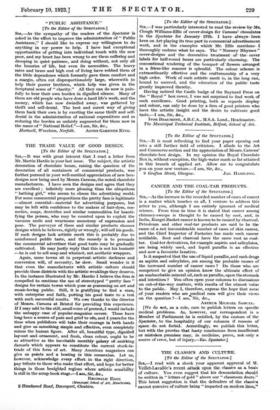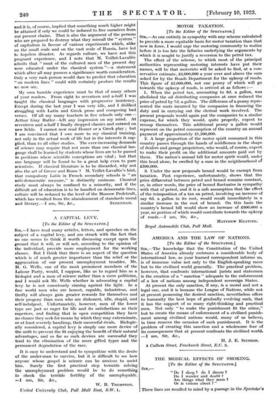TIM CLASSICS AND' CULTURE.
[TO Me Editor of the SexerA.roe.]
Sur„-..—L read with a shock your apparent approval. of M. Veillet-Lavallee's recent attack upon the classics as a.. basis of culture. You even suggest that his denunciation,. should be written in " letters of gold " above our " classroom doors." This latest suggestion. is that the, defenders of . the cb.ssies cannot conceive of culture being "`imparted' on modem lines,"
and it is, of course, implied that something much higher might be attained if only we could be induced to free ourselves from our present chains. That is also the argument of the persons who are prepared to destroy what they miscall the " systein." of capitalism in favour of various experiments which, alike on the small scale and on the vast scale of Russia, have led to hopeless disaster. As regards culture, we have not this pregnant experience, and I note that M. Veillet-Lavallee admits that " most of the cultured men of the present day were educated under the classical system "—a statement which after all may possess a significance worth consideration. Only a very rash person would dare to predict that education " on modern lines " could with certainty produce the results we now see.
My own humble experience must be that of many others of your readers. From eight to seventeen and a-half I was taught the classical languages with progressive insistency. Except during the last year I was very idle, and I disliked struggling with Latin and Greek prose and composing bad verses. Of all my many teachers in five schools only one— Arthur Gray Butler—left any impression on my mind. At seventeen and a-half I finally dropped classics and entered on new fields. I cannot now read Homer or a Greek play ; but I am convinced that I owe more to my classical training, not only in the actual work of life but in the interests it sup- plied, than to all other studies. The ever-increasing demands of science may require that not more than one classical lan- guage shall be learned by students whose lives are to be passed in positions where scientific conceptions are vital ; but that one language will be found to be a great help even to pure scientists. If classical literature is to be discarded, why not also the art of Greece and Rome ? M. Veillet-Lavallee's hint, that compulsory Latin in French secondary schools is " an anti-democratic measure," is distinctly ominous. Classical study must always be confined to a minority, and if the difficult art of education is to be handled on democratic lines, culture will be reduced to the level of the Moscow Proletcult, which has resulted from the abandonment of standards moral



































































 Previous page
Previous page